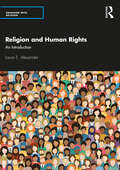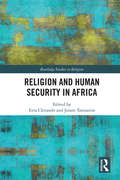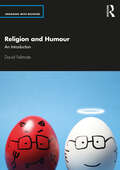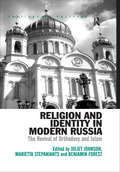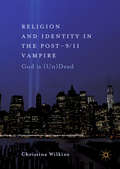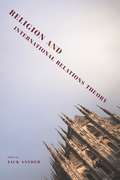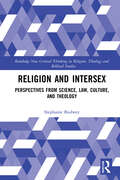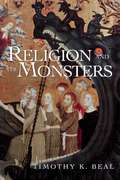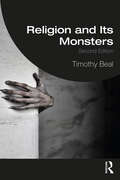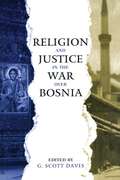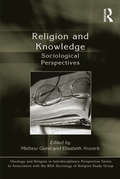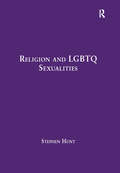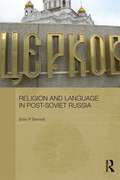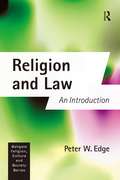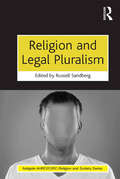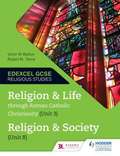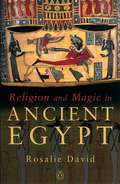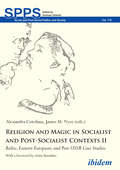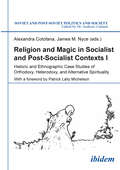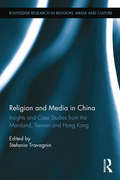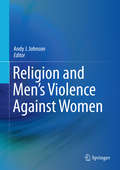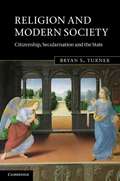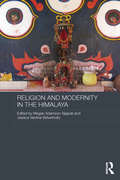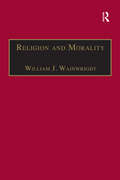- Table View
- List View
Religion and Human Rights: An Introduction (Engaging with Religion)
by Laura E. AlexanderThis book highlights perspectives from religious traditions worldwide, in conversation with other communities who promote, critique, or question the idea of human rights. It shows how human rights can provide a platform for dialogue among groups of people from diverse backgrounds who seek to address pressing issues of human well-being. In each chapter, readers will be introduced to religious and human rights perspectives on specific global issues. Intersecting with these issues, the work examines history and philosophy of human rights, for a generally accessible overview of human rights theory, foundations, and critique. Specific case studies woven through the book will also help both students and advocates – whether they are part of religious communities or not – engage more deeply with particular areas of concern. This volume is a useful resource for undergraduate students who are learning about the relationship between religion and human rights in a classroom for the first time, as well as upper-level and graduate students looking for a broad basis of knowledge and a starting point for digging deeper into specific areas of scholarship.
Religion and Human Security in Africa (Routledge Studies in Religion)
by Ezra Chitando Joram TarusariraAcross diverse countries and contexts in Africa, religion has direct implications for human security. While some individuals and groups seek to manipulate and control through the deployment of religion, religious belief is also a common facet of those working towards peace and reconciliation. Despite the strategic importance of religion to human security in Africa, there are few contemporary publications that explore this issue on an international scale. This volume redresses that imbalance by examining religion’s impact on human security across Africa. Written by an international team of contributors, this book looks in detail at the intersection of religion and security in a variety of African contexts. Case studies from a diverse set of countries including Nigeria, Ghana, South Africa, Burkina Faso, and more, are used to illustrate wider trends across the continent. Acknowledging that religion can be used to incite violence as well as encourage peace, the chapters employ an interdisciplinary exploration of the ethics, sociology, and politics around these issues. This is much needed volume on religion’s capacity to effect human security. It will, therefore, be of significant interest to any scholar of religious studies, African studies, political science, the sociology of religion, and anthropology, as well as peace, conflict, and reconciliation studies.
Religion and Humour: An Introduction (Engaging with Religion)
by David FeltmateThis timely and lively introduction to exploring the intersection of religion and humour evaluates existing scholarship and methodologies within the field, arguing for a culturally critical approach to the study.Hinged on a qualitative sociological framework, this book asks questions about the construction, presentation, and purpose of humour in religious contexts. It is broken down by theoretical approach, with chapters covering: a “comparative religions” approach; a theological approach; how social sciences offer us useful tools for research; and a review of existing theoretical models. As the first volume to introduce the field of religion and humour, this engaging book is essential reading for students approaching the topic for the first time, and for anyone with an interest in related fields such as religion and popular culture and humour studies.
Religion and Identity in Modern Russia: The Revival of Orthodoxy and Islam (Post-Soviet Politics)
by Juliet Johnson Marietta Stepaniants Benjamin ForestFocusing on the roles of Russian Orthodoxy and Islam in constituting, challenging and changing national and ethnic identities in Russia, this study takes Tsarist and Soviet legacies into account, paying special attention to the evolution of the relationship between religious teachings and political institutions through the late 19th and 20th centuries. The volume explicitly discusses and compares the role of Russia's two major religions, Orthodoxy and Islam, in forging identity in the modern era and brings an innovative blend of sociological, historical, linguistic and geographic scholarship to the problem of post-Soviet Russian identity. This comprehensive volume is suitable for courses on post-Soviet politics, Russian studies, religion and political culture.
Religion and Identity in the Post-9/11 Vampire: God Is (un)dead
by Christina WilkinsThis book offers a unique argument for the emergence of a post-9/11 vampire that showcases changing perspectives on identity and religion in American culture, offering a look at how cultural narratives can be used to work through trauma. Cultural narratives have long played a valuable role in mediating difficult and politically sensitive topics. Christina Wilkins addresses how the figure of the vampire is used in modern narratives and how it has changed from previous incarnations, particularly in American narratives. The vampire has been a cultural staple for centuries but the current conception of the figure has been arguably Americanized with the rise of the modern American vampire coinciding with the aftermath of 9/11. Wilkins investigates changes evident in cultural representations, and how they effectively mediate the altered approach to issues of trauma and identity. By investing metaphorical tropes with cultural significance, the book offers audiences the opportunity to consider new perspectives and prompt important discussions while also illuminating changes in societal attitudes.
Religion and Inequality in America
by Lisa A. Keister Darren E. SherkatDespite the growing quantity and quality of research connecting religion to inequality, no single volume to date brings together key figures to discuss various components of this process. This volume aims to fill this gap with contributions from top scholars in the fields of religion and sociology. The essays in this volume provide important new details about how and why religion and inequality are related by focusing on new indicators of inequality and well-being, combining and studying mediating factors in new and informative ways, focusing on critical and often understudied groups, and exploring the changing relationship between religion and inequality over time.
Religion and International Relations Theory (Religion, Culture, and Public Life #10)
by Jack SnyderReligious concerns stand at the center of international politics, yet key paradigms in international relations, namely realism, liberalism, and constructivism, barely consider religion in their analysis of political subjects. The essays in this collection rectify this. Authored by leading scholars, they introduce models that integrate religion into the study of international politics and connect religion to a rising form of populist politics in the developing world. Contributors identify religion as pervasive and distinctive, forcing a reframing of international relations theory that reinterprets traditional paradigms. One essay draws on both realism and constructivism in the examination of religious discourse and transnational networks. Another positions secularism not as the opposite of religion but as a comparable type of worldview drawing on and competing with religious ideas. With the secular state's perceived failure to address popular needs, religion has become a banner for movements that demand a more responsive government. The contributors to this volume recognize this trend and propose structural and theoretical innovations for future advances in the discipline.
Religion and Intersex: Perspectives from Science, Law, Culture, and Theology (Routledge New Critical Thinking in Religion, Theology and Biblical Studies)
by Stephanie A. BudweyThis book considers the situation of intersex people who have faced erasure in the areas of science, law, culture, and theology due to the assumption that all humans are either ‘female’ or ‘male.’ Centered in interviews conducted with German intersex Christians, this book argues that moving from a paradigm of sexual dimorphism to sexual polymorphism will help promote the full humanity and flourishing of intersex people by creating a world where intersex individuals are no longer coerced and/or forced to undergo non-consensual, medically unnecessary treatment, no longer experience human rights violations because of their lack of legal protection, no longer feel inhuman and Other due to epistemic injustice that stems from socio-cultural norms and stereotypes, are no longer told they are not made in God’s image as a result of a sexually dimorphic understanding of Genesis 1:27, and no longer feel excluded and invisible in worship services that do not recognize them. This combination of the practical and the spiritual allows for a reconsideration of the medical treatment and pastoral care that should be available to intersex people. This book will be helpful to those in the disciplines of science, law, culture, and theology, particularly those in gender and theological studies and those already in and studying for lay and ordained ministry.
Religion and Its Monsters
by Timothy BealReligion's great and powerful mystery fascinates us, but it also terrifies. So too the monsters that haunt the stories of the Judeo-Christian mythos and earlier traditions: Leviathan, Behemoth, dragons, and other beasts. In this unusual and provocative book, Timothy K. Beal writes about the monsters that lurk in our religious texts, and about how monsters and religion are deeply entwined. Horror and faith are inextricable. Ans as monsters are part of religious texts and traditions, so religion lurks in the modern horror genre, from its birth in Dante's Inferno to the contemporary spookiness of H.P. Lovecraft and the Hellraiser films. Religion and Its Monsters is essential reading for students of religion and popular culture, as well as any readers with an interest in horror.
Religion and Its Monsters
by Timothy BealReligious encounters with mystery can be fascinating, but also terrifying. So too when it comes to encounters with the monsters that haunt Jewish and Christian traditions. Religion has a lot to do with horror, and horror has a lot to do with religion. Religion has its monsters, and monsters have their religion. In this unusual and provocative book, Timothy Beal explores how religion, horror, and the monstrous are deeply intertwined. This new edition has been thoughtfully updated, reflecting on developments in the field over the past two decades and highlighting its contributions to emerging conversations. It also features a new chapter, "Gods, Monsters, and Machines," which engages cultural fascinations and anxieties about technologies of artificial intelligence and machine learning as they relate to religion and the monstrous at the dawn of the Anthropocene. Religion and Its Monsters is essential reading for students and scholars of religion and popular culture, as well as for any readers with an interest in horror theory or monster theory.
Religion and Justice in the War Over Bosnia
by G. Scott DavisThis volume brings together a distinguished group of thinkers, working in ethics, religion and history, to explore moral and religious issues that underlie the violence in Bosnia. ********************************************************* This volume brings together a distinguished group of thinkers to explore the moral and religious issues that underlie the violence and atrocities in Bosnia. From diverse academic and philosophical perspectives, the works of Jean Bethke Elshtain, James Turner Johnson, Michael Sells, John Kelsay, and G. Scott Davis will inform not just scholars of ethics, politics and religion, but everyone concerned with the prospects for justice in the post Cold War world.
Religion and Knowledge: Sociological Perspectives (Theology and Religion in Interdisciplinary Perspective Series in Association with the BSA Sociology of Religion Study Group)
by Mathew GuestReligions have always been associated with particular forms of knowledge, often knowledge accorded special significance and sometimes knowledge at odds with prevailing understandings of truth and authority in wider society. New religious movements emerge on the basis of reformulated, often controversial, understandings of how the world works and where ultimate meaning can be found. Governments have risen and fallen on the basis of such differences and global conflict has raged around competing claims about the origins and content of religious truth. Such concerns give rise to recurrent questions, faced by academics, governments and the general public. How do we treat statements made by religious groups and on what basis are they made? What authorities lie behind religious claims to truth? How can competing claims about knowledge be resolved? Are there instances when it is appropriate to police religious knowledge claims or restrict their public expression? This book addresses the relationship between religion and knowledge from a sociological perspective, taking both religion and knowledge as phenomena located within ever changing social contexts. It builds on historical foundations, but offers a distinctive focus on the changing status of religious phenomena at the turn of the twenty-first century. Including critical engagement with live debates about intelligent design and the ’new atheism’, this collection of essays brings recent research on religious movements into conversation with debates about socialisation, reflexivity and the changing capacity of social institutions to shape human identities. Contributors examine religion as an institutional context for the production of knowledge, as a form of knowledge to be transmitted or conveyed and as a social field in which controversies about knowledge emerge.
Religion and LGBTQ Sexualities: Critical Essays
by Stephen HuntThis compiled and edited collection engages with a theme which is increasingly attracting scholarly attention, namely, religion and LGBTQ sexuality. Each section of the volume provides perspectives to understanding academic discourse and wide-ranging debates around LGBTQ sexualities and religion and spirituality. The collection also draws attention to aspects of religiosity that shape the lived experiences of LGBTQ people and shows how sexual orientation forges dimensions of faith and spirituality. Taken together the essays represent an exploration of contestations around sexual diversity in the major religions; the search of sexual minorities for spiritual ’safe spaces’ in both established and new forms of religiosity; and spiritual paths formed in reconciling and expressing faith and sexual orientation. This collection, which features contributions from a number of disciplines including sociology, anthropology, psychology, history, religious studies and theology, provides an indispensable teaching resource for educators and students in an era when LGBTQ topics are increasingly finding their way onto numerous undergraduate, post-graduate and profession orientated programmes.
Religion and Language in Post-Soviet Russia (Routledge Contemporary Russia and Eastern Europe Series)
by Brian P. BennettChurch Slavonic, one of the world's historic sacred languages, has experienced a revival in post-Soviet Russia. Blending religious studies and sociolinguistics, this is the first book devoted to Church Slavonic in the contemporary period. It is not a narrow study in linguistics, but uses Slavonic as a passkey into various wider topics, including the renewal and factionalism of the Orthodox Church; the transformation of the Russian language; and the debates about protecting the nation from Western cults and culture. It considers both official and popular forms of Orthodox Christianity, as well as Russia's esoteric and neo-pagan traditions. Ranging over such diverse areas as liturgy, pedagogy, typography, mythology, and conspiracy theory, the book illuminates the complex interrelationship between language and faith in post-communist society, and shows how Slavonic has performed important symbolic work during a momentous chapter in Russian history. It is of great interest to scholars of sociolinguistics and of religion, as well as to Russian studies specialists.
Religion and Law: An Introduction (Religion, Culture and Society Series)
by Peter W. EdgeDiscussion of the way in which law engages with religious difference often takes place within the context of a single jurisdiction. Religion and Law: An Introduction, presents a comprehensive text for students, drawing on examples from across key Anglophone jurisdictions - the United Kingdom, the United States, Canada, New Zealand, Australia and South Africa, as well as international law, to explore a broad range of issues. Aimed at a non-legal readership, this book introduces the use of legal sources and focuses on factual situations as much as legal doctrine. Key issues arising from interaction of the religious individual and the State are discussed, as well as the religious organisation or community and the State. The interaction is explored through case studies of areas as diverse as the legal regulation of religious drug use, sacred spaces and sacred places, and claims of clergy misconduct. Taking a broad, non-jurisdictional approach to the key issues, in particular providing insights differing from the dominant US experiences and paradigms, this student-friendly textbook includes a clearly structured bibliography and clear guidance on how to approach relevant legal materials.
Religion and Legal Pluralism (AHRC/ESRC Religion and Society Series)
by Russell SandbergIn recent years, there have been a number of concerns about the recognition of religious laws and the existence of religious courts and tribunals. There has also been the growing literature on legal pluralism which seeks to understand how more than one legal system can and should exist within one social space. However, whilst a number of important theoretical works concerning legal pluralism in the context of cultural rights have been published, little has been published specifically on religion. Religion and Legal Pluralism explores the extent to which religious laws are already recognised by the state and the extent to which religious legal systems, such as Sharia law, should be accommodated.
Religion and Life through Roman Catholic Christianity (Unit #8)
by Robert M. Stone Victor W. WattonThe only book on the market to bring together Unit 3 and Unit 8 from the Edexcel GCSE Religious Studies specification, ensuring that students have everything they need in one place. - Engages students with each area of the specification through quotes, summaries and questions for every topic - Helps students prepare for assessment with up-to-date guidance including exam-style questions, sample student answers and advice - Offers a full-course book from best-selling author Victor Watton drawing on his many years' experience writing textbooks and learning resources
Religion and Magic in Ancient Egypt
by Rosalie DavidThe ancient Egyptians believed that the Nile - their life source - was a divine gift. Religion and magic permeated their civilization, and this book provides a unique insight into their religious beliefs and practices, from 5000 BC to the 4th century AD, when Egyptian Christianity replaced the earlier customs. Arranged chronologically, this book provides a fascinating introduction to the world of half-human/ half-animal gods and goddesses; death rituals, the afterlife and mummification; the cult of sacred animals, pyramids, magic and medicine. An appendix contains translations of Ancient Eygtian spells.
Religion and Magic in Socialist and Post-Socialist Contexts II: Baltic, Eastern European, and Post-USSR Case Studies (Soviet and Post-Soviet Politics and Society #173)
by James M. Nyce Alexandra CotofanaReligion and magic have often played important roles in Baltic, Eastern European, and post-Soviet societies like those in Russia, Romania, Serbia, Latvia, Kyrgyzstan, and Estonia. Taken together, the studies presented in this collection suggest that the idea that religion and magic are connected to each other in some consistent, universal way may be nothing more than a remnant from nineteenth-century anthropology. Further, these studies challenge another part of anthropology's historical legacy: the idea that magic is something that modernity and modernization will transcend. Rather, these studies suggest instead that magic is a form of work that brings modernity into being and helps render it intelligible to those who find themselves engaged in its creation.This volume brings together historical (pre- and post-1989), ethnographic, and area studies that look at the divergent roles of state, culture, society, tradition, and the individual in enactments of magic and religion. Assessing the role magic and religion have played in the countries of Eastern Europe and beyond before and after the Cold War, it is an absorbing read for scholars of anthropology and history as well as ethnology.
Religion and Magic in Socialist and Post-Socialist Contexts: Historic and Ethnographic Case Studies of Orthodoxy, Heterodoxy, and Alternative Spirituality (Soviet and Post-Soviet Politics and Society #163)
by James M. Nyce Alexandra CotofanaReligion and magic have played important roles within Eastern European societies where social reality and sociopolitical balance may differ greatly from those in the West. Although often thought of as being two distinct, even antagonistic forces, religion and magic find ways to work together. By taking on various examples in the multicultural settings of post-Soviet and postsocialist spaces, this collection brings together diverse historical and ethnographic analyses of orthodoxy and heterodoxy from the pre- and post-1989 periods, studies on the relationship of religious and state institutions to individuals practicing alternative forms of spirituality, and examples of borderlands as spaces of ambiguity. This volume is at the crossroads of anthropology, history, as well as cultural memory studies. Its archival and field research findings help understand how repurposing religious and magic practices worked into the transition that countries in Eastern Europe and beyond have experienced after the end of the Cold War.
Religion and Media in China: Insights and Case Studies from the Mainland, Taiwan and Hong Kong (Routledge Research in Religion, Media and Culture)
by Stefania TravagninThis volume focuses on the intersection of religion and media in China, bringing interdisciplinary approaches to bear on the role of religion in the lives of individuals and greater shifts within Chinese society in an increasingly media-saturated environment. With case studies focusing on Mainland China (including Tibet), Hong Kong and Taiwan, as well as diasporic Chinese communities outside Asia, contributors consider topics including the historical and ideological roots of media representations of religion, expressions of religious faith online and in social media, state intervention (through both censorship and propaganda), religious institutions’ and communities’ use of various forms of media, and the role of the media in relations between online/offline and local/diaspora communities. Chapters engage with the major religious traditions practiced in contemporary China, namely Buddhism, Daoism, Confucianism, Christianity, Islam, and new religious movements. Religion and the Media in China serves as a critical survey of case studies and suggests theoretical and methodological tools for a thorough and systematic study of religion in modern China. Contributors to the volume include historians of religion, sinologists, sociologists, political scientists, anthropologists, and media and communication scholars. The critical theories that contributors develop around key concepts in religion—such as authority, community, church, ethics, pilgrimage, ritual, text, and practice—contribute to advancing the emerging field of religion and media studies.
Religion and Men's Violence Against Women
by Andy J. JohnsonThis reference offers the nuanced understanding and practical guidance needed to address domestic violence, sexual assault, and human trafficking in diverse religious communities. Introductory chapters sort through the complexities, from abusers' distorting of sacred texts to justifying their actions to survivors' conflicting feelings toward their faith. The core of the book surveys findings on gender violence across Christian, Jewish, Islamic, Eastern, and Indigenous traditions--both attitudes that promote abuse and spiritual resources that can be used to promote healing. Best practices are included for appropriate treatment of survivors, their children, and abusers; and for partnering with communities and clergy toward stemming violence against women. Among the topics featured: Ecclesiastical policies vs. lived social relationships: gender parity, attitudes, and ethics. Women's spiritual struggles and resources to cope with intimate partner aggression. Christian stereotypes and violence against North America's native women. Addressing intimate partner violence in rural church communities. Collaboration between community service agencies and faith-based institutions. Providing hope in faith communities: creating a domestic violence policy for families. Religion and Men's Violence against Women will gain a wide audience among psychologists, social workers, marriage and family therapists, and other mental health professionals who treat religious clients or specialize in treating survivors and perpetrators of domestic and intimate partner violence, stalking, sexual assault, rape, or human trafficking.
Religion and Modern Society
by Bryan S. TurnerReligion is now high on the public agenda, with recent events focusing the world's attention on Islam in particular. This book provides a unique historical and comparative analysis of the place of religion in the emergence of modern secular society. Bryan S. Turner considers the problems of multicultural, multi-faith societies and legal pluralism in terms of citizenship and the state, with special emphasis on the problems of defining religion and the sacred in the secularisation debate. He explores a range of issues central to current debates: the secularisation thesis itself, the communications revolution, the rise of youth spirituality, feminism, piety and religious revival. Religion and Modern Society contributes to political and ethical controversies through discussions of cosmopolitanism, religion and globalisation. It concludes with a pessimistic analysis of the erosion of the social in modern society and the inability of new religions to provide 'social repair'.
Religion and Modernity in the Himalaya (Routledge Contemporary South Asia Series)
by Megan Adamson Sijapati Jessica Vantine BirkenholtzReligion has long been a powerful cultural, social, and political force in the Himalaya. Increased economic and cultural flows, growth in tourism, and new forms of governance and media, however, have brought significant changes to the religious traditions of the region in the twentieth and twenty-first centuries. This book presents detailed case studies of lived religion in the Himalaya in this context of rapid change to offer intra-regional perspectives on the ways in which lived religions are being re-configured or re-imagined. Based on original fieldwork, this book documents understudied forms of religion in the region and presents unique perspectives on the phenomenon and experience of religion, discussing why, when, and where practices, discourses, and the category of religion itself, are engaged by varying communities in the region. It yields fruitful insights into both the religious traditions and lived human experiences of Himalayan peoples in the modern era. Presenting new research and perspectives on the Himalayan region, this book should be of interest to students and scholars of South Asian Studies, Religious Studies, and Modernity.
Religion and Morality (Routledge Philosophy of Religion Series)
by William J. WainwrightReligion and Morality addresses central issues arising from religion's relation to morality. Part I offers a sympathetic but critical appraisal of the claim that features of morality provide evidence for the truth of religious belief. Part II examines divine command theories, objections to them, and positive arguments in their support. Part III explores tensions between human morality, as ordinarily understood, and religious requirements by discussing such issues as the conflict between Buddhist and Christian pacifism and requirements of justice, whether 'virtue' without a love of God is really a vice, whether the God of the Abrahamic religions could require us to do something that seems clearly immoral, and the ambiguous relations between religious mysticism and moral behavior. Covering a broad range of topics, this book draws on both historical and contemporary literature, and explores afresh central issues of morality and religion offering new insights for students, academics and the general reader interested in philosophy and religion.
